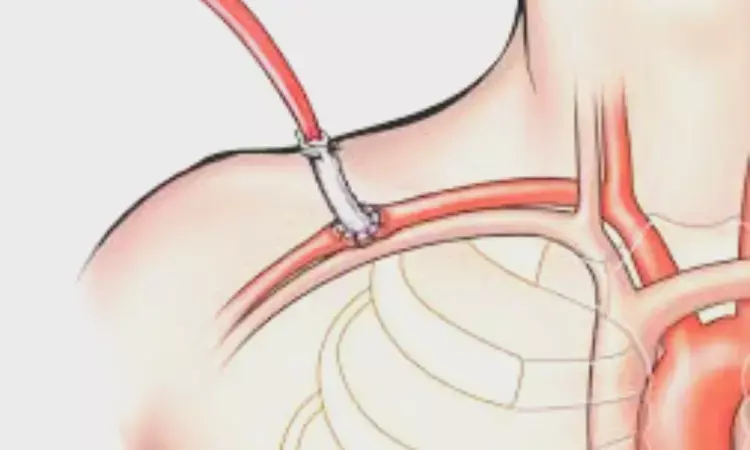- Home
- Medical news & Guidelines
- Anesthesiology
- Cardiology and CTVS
- Critical Care
- Dentistry
- Dermatology
- Diabetes and Endocrinology
- ENT
- Gastroenterology
- Medicine
- Nephrology
- Neurology
- Obstretics-Gynaecology
- Oncology
- Ophthalmology
- Orthopaedics
- Pediatrics-Neonatology
- Psychiatry
- Pulmonology
- Radiology
- Surgery
- Urology
- Laboratory Medicine
- Diet
- Nursing
- Paramedical
- Physiotherapy
- Health news
- Fact Check
- Bone Health Fact Check
- Brain Health Fact Check
- Cancer Related Fact Check
- Child Care Fact Check
- Dental and oral health fact check
- Diabetes and metabolic health fact check
- Diet and Nutrition Fact Check
- Eye and ENT Care Fact Check
- Fitness fact check
- Gut health fact check
- Heart health fact check
- Kidney health fact check
- Medical education fact check
- Men's health fact check
- Respiratory fact check
- Skin and hair care fact check
- Vaccine and Immunization fact check
- Women's health fact check
- AYUSH
- State News
- Andaman and Nicobar Islands
- Andhra Pradesh
- Arunachal Pradesh
- Assam
- Bihar
- Chandigarh
- Chattisgarh
- Dadra and Nagar Haveli
- Daman and Diu
- Delhi
- Goa
- Gujarat
- Haryana
- Himachal Pradesh
- Jammu & Kashmir
- Jharkhand
- Karnataka
- Kerala
- Ladakh
- Lakshadweep
- Madhya Pradesh
- Maharashtra
- Manipur
- Meghalaya
- Mizoram
- Nagaland
- Odisha
- Puducherry
- Punjab
- Rajasthan
- Sikkim
- Tamil Nadu
- Telangana
- Tripura
- Uttar Pradesh
- Uttrakhand
- West Bengal
- Medical Education
- Industry
Ketorolac Reduces ICU Stay and Bleeding in Aortic Dissection Patients, confirms study

Researchers have reported in a new study published in BMC Medicine that ketorolac, administered perioperatively, is associated with a decrease in intraoperative bleeding, decreased ICU lengths of stay, and reduced overall hospital costs for patients undergoing operation for acute Type A aortic dissection (aTAAD). The study was conducted by Zhi-Kang and fellow researchers.
Acute Type A aortic dissection (aTAAD) is a severe cardiovascular emergency involving disruption of the intimal layer of the aorta, with rapid hemodynamic decline and high mortality unless surgically treated. Laboratory studies have implied that nonsteroidal anti-inflammatory drugs (NSAIDs) such as ketorolac may retard the progression of aortic dissection, but such evidence in human beings has not been available. This randomized controlled trial sought to assess whether perioperative ketorolac administration would safely and effectively enhance outcomes in aTAAD patients, with particular emphasis on mortality, organ malperfusion, and other postoperative parameters.
The trial included 110 patients who were eligible out of a total of 179 patients undergoing aTAAD surgery. Patients were randomly assigned to receive ketorolac or a placebo (0.9% saline solution).
• Preoperative Dose: Given at least 2 hours prior to surgery — either 60 mg ketorolac intramuscularly or 2 ml saline.
• Postoperative Dose: Extended for 48 hours — 30 mg ketorolac intramuscularly or 1 ml saline, twice a day.
Patients were monitored closely, with the main endpoints being safety and efficacy, with an emphasis on mortality and organ malperfusion incidence. Secondary endpoints were drug-related adverse events, intraoperative bleeding, duration of ICU stay, and hospital cost. Of 110 randomly assigned patients, one from the ketorolac group withdrew due to erythroderma, resulting in 54 patients in the ketorolac group and 55 in the placebo group being available for final analysis.
Key Findings
Although the two groups were similar in terms of the main outcomes of mortality and organ malperfusion, several secondary benefits occurred in the ketorolac group:
Intraoperative bleeding:
• Ketorolac group: Median of 1.8 liters
• Placebo group: Median of 2.0 liters
• Statistical significance: P = 0.03
Duration of stay in the ICU:
• Ketorolac group: Median of 6.5 days
• Placebo group: Median of 8 days
• Statistical significance: P = 0.04
Hospital costs:
Total hospital costs:
• Ketorolac group: Median of ¥170,430
• Placebo group: Median of ¥187,730
• Statistical significance: P = 0.03
• No increase in drug-related adverse effects was significant, and the overall safety profile of ketorolac was acceptable throughout the perioperative period.
Short-term administration of ketorolac in acute Type A aortic dissection patients did not affect primary outcomes such as mortality and organ malperfusion, but it resulted in substantial decreases in intraoperative bleeding, ICU stay time, and hospitalization expense. These findings affirm the safety and peroperative potential of ketorolac in aTAAD treatment.
Reference:
Lv, ZK., Zhang, HT., Cai, XJ. et al. Ketorolac in the perioperative management of acute type A aortic dissection: a randomized double-blind placebo-controlled trial. BMC Med 23, 188 (2025). https://doi.org/10.1186/s12916-025-04021-1
Dr Riya Dave has completed dentistry from Gujarat University in 2022. She is a dentist and accomplished medical and scientific writer known for her commitment to bridging the gap between clinical expertise and accessible healthcare information. She has been actively involved in writing blogs related to health and wellness.
Dr Kamal Kant Kohli-MBBS, DTCD- a chest specialist with more than 30 years of practice and a flair for writing clinical articles, Dr Kamal Kant Kohli joined Medical Dialogues as a Chief Editor of Medical News. Besides writing articles, as an editor, he proofreads and verifies all the medical content published on Medical Dialogues including those coming from journals, studies,medical conferences,guidelines etc. Email: drkohli@medicaldialogues.in. Contact no. 011-43720751


